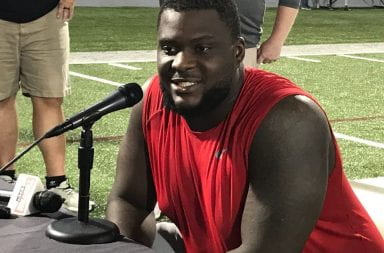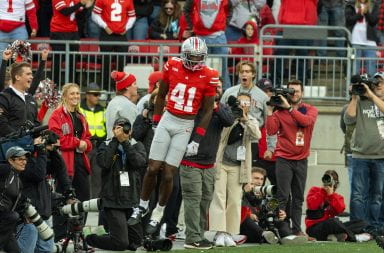
Ohio State students held several protests against antisemitism and vigils for Israel last semester. Matt Levine thinks Ohio State could do more to address antisemitism on Ohio State’s campus. Photo illustration credit: Lily Hynes
This piece is the perspective of Matt Levine, a second-year in finance at Ohio State.
Ohio State has an antisemitism problem.
It’s far from the only university that does, but while other public universities have embraced their Jewish community, Ohio State has left its approximately 3,000 Jewish students to fend for themselves.
While Miami University’s president Gregory Crawford publicly lit the menorah for an on-campus Hanukkah celebration in December 2023, Ohio State’s president was nowhere to be seen at Chabad’s menorah lighting.
It shouldn’t be that hard for the administration to show support. Over the last three months, Ohio State’s Jewish community has faced several incidents from vandalism of Ohio State’s Hillel building, menacing of the Alpha Epsilon Pi house — a Jewish fraternity unrecognized by Ohio State — calls for intifada in the Ohio Union and even physical assault on students.
Despite all these incidents, the university has struggled to produce an adequate response. After the Nov. 10 assault, which required one victim to go to the hospital, then-acting President Peter Mohler could only muster a statement that condemned antisemitism along with other forms of hate. It condemned antisemitism and bigotry and Islamophobia and racism.
These are all things that should never be tolerated, but why include them in a statement when the victim was Jewish?
It came as no surprise, then, when on Jan. 15, StandWithUs — an international Jewish advocacy organization — sent a 16-page letter to university President Ted Carter Jr. and his administration detailing all these incidents and more. The letter went on to demand that the administration take proper action to protect its students. The next day, the U.S. Department of Education opened an investigation into the violation of Jewish students’ Title VI protections.
Carter finds himself at an interesting crossroads less than a month into the job. The decision to improve life for Jewish students should be an easy one. He has been given a roadmap that at the very least could shield Ohio State from legal action, but ideally will lead the university to structural changes that protects one of its minority populations.
As a Jewish stakeholder on campus, I have been thankful for internal support from the administration, including a meeting with Carter on Jan. 12 with 15 other Jewish students.
But that’s far from adequate.
Since the start of the Israel-Hamas war on Oct. 7, 2023, Jewish students have fought an uphill battle. From defending Israel’s right to exist to overthinking whether to wear their Jewish stars, the community is exhausted.
Many have become indifferent. Others work tirelessly to fight antisemitism. Both are understandable responses — and both have their drawbacks. I know I have neglected my schoolwork and finance degree because this is bigger than my professional goals.
The days of only being a business student are missed.
When I made the choice to attend the Students for Justice in Palestine rally in the Ohio Union on Jan. 11, I wasn’t prepared for what I heard. It was my second day back from Israel after attending a nine-day Wartime Fact Finders trip, alongside 23 remarkable Jewish and non-Jewish students from across the nation, assembled by Maccabee Task Force, an organization created in 2015 to combat the disturbing spread of antisemitism on college campuses. I hadn’t processed the trip yet — I am still processing it. Stories of rape and barbarism echoed in my head, as did accounts of corpses that simply crumbled to ash when the first responders handled them.
As the protesters called out, “There is only one solution, intifada revolution,” my legs went weak. I felt helpless. I looked at the police but they couldn’t help me. I looked toward administrators but they couldn’t help either.
It’s about time everyone listened — Jewish students have for long enough. It’s up to Carter to listen, too. And if not, the Department of Education has given him something to read instead.


